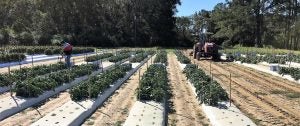You can drop all the science you want onto someone, but without transparency, there will always be skeptics. That was part of the reason Cool Planet, a Denver-based ag tech soil health company, has opted to reveal a multitude of its research findings and launch a Trial Results Database.
The platform will feature a searchable database of over 80 different trials, rendering 30 different types of crops grown across the United States, Mexico, and China. Cool Planet partnered with over 50 independent, third-party university and agricultural researchers to conduct the studies.
The database, which came online publicly Thursday, can be found here.
In it, you’ll see graphs that compare the company’s line of Cool Terra-treated plots versus “standard treatment plots.” They depict such things as fresh-market tomato yields from 2016 plots in Wimauma, Florida, to be up as much as 22 percent over the “standard”; or corn yields from Visalia, California, in 2017 up 10 percent. Groups such as Kansas State University, Colorado State University, and the University of Missouri are among the land-grant schools that are listed as having overseen the research.
Each researcher/cooperator was in charge of establishing what was “standard” for each typical commercial grower program for that specific crop, season, and region — thus creating the comparison model. Elements of the “Grower Standard” were fertility decisions (type, how much, how often, application method), crop protection (insecticide, fungicide, herbicide, products, timing, application method), irrigation (how often, method), variety or hybrid (common commercial varieties), field setup (row spacing, seed counts, irrigation setup, bed dimensions), harvest timing, and a multitude of other factors.

The trial program utilized standard design methods for most of the trials, including randomized, complete block, replicated design, where fields or orchards are divided into units to account for any soil variation in the field. When asked for specifics about such things as acreage, funding, researcher experience, and seed selection, a Cool Planet representative said, “In some cases, we were restricted with the type of information we could share publicly, and we decided the database wasn’t the right venue to share some information without proper context, or a deeper conversation with growers and our industry partners.”
He also said that in one-on-one conversations with growers, the company and its industry partners would be open to providing more nuanced details such as application rates and acreage.
While added transparency is always a scientific plus, the database will also end up serving as part of a strategy to promote Cool Terra products (and their Engineered Biocarbon Technology), which aim to improve soil health, reduce water consumption, and help optimize fertilizer use while sequestering substantial amounts of carbon — a trifecta, of sorts, toward soil health, food security, and sustainability. The highly porous physical structure of Cool Terra also makes it a promising delivery system for microbials and nutritionals designed to enhance plant growth and productivity.
The data is interesting to pore over, and for farmers who are looking to gain an edge (really, who isn’t?), there are a lot of crops that are encompassed here.


